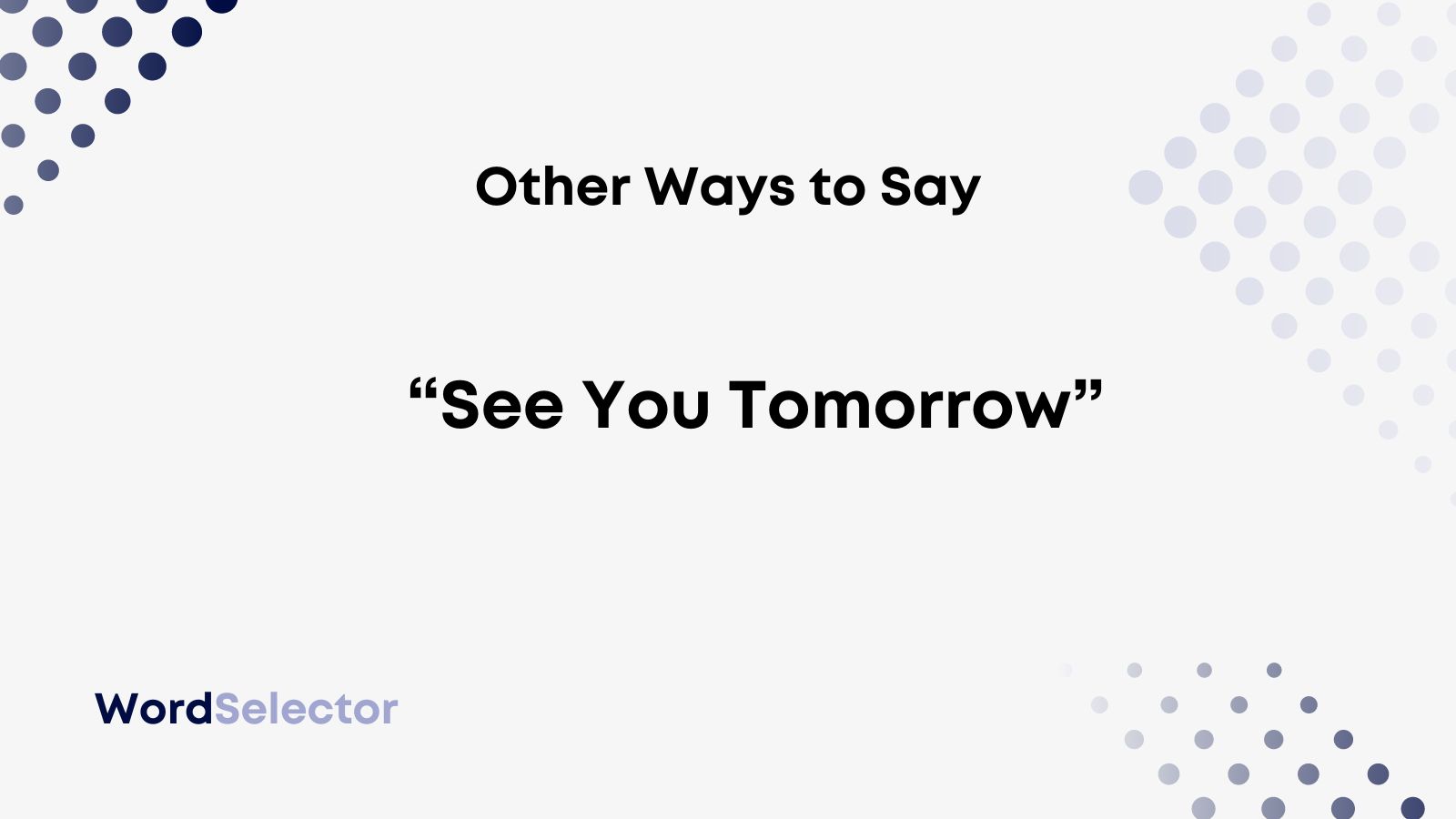So, you’ve set up some plans to meet someone tomorrow, right? You might be wondering whether “see you tomorrow” is appropriate in every context.
Luckily, we are able to answer that for you!
Keep reading to learn more about how to say “see you tomorrow” professionally and conversationally.
Other Ways to Say “See You Tomorrow”
- I look forward to our meeting tomorrow
- Catch you later
- See you tomorrow morning/afternoon/evening
- I look forward to seeing you again soon
- It’ll be nice to meet tomorrow
- Let’s see each other again tomorrow
- Glad we’ve got these plans sorted
- See you tomorrow over Zoom
- See you on video chat tomorrow
- Look forward to hearing from you tomorrow
- See you at some point tomorrow
KEY TAKEAWAYS
- “See you tomorrow” works well in spoken situations, but you shouldn’t use it in formal emails.
- Try using “I look forward to our meeting tomorrow” as a more formal alternative.
- “Catch you later” is great to use conversationally.
There are some great synonyms available when thinking of another way to say “see you tomorrow.” Keep reading to explore some of the most effective ones.
We’ve also covered whether it’s correct to say “see you tomorrow” in the first place. We recommend skipping to the last section if that interests you.
I Look Forward to Our Meeting Tomorrow (Formal)
“I look forward to our meeting tomorrow” is a very useful formal alternative to “see you tomorrow.” You should use it when you’ve set up plans that will occur on the following day.
Generally, this phrase works best over email. You should use it when emailing your boss to show enthusiasm. It’s a good way of letting your boss know you’re keen to meet with them and discuss new ideas.
“I look forward to our meeting tomorrow” also works well online. You can use it when setting up virtual meetings between two (or more) parties. After all, you don’t have to have a physical meeting place to use a phrase like this.
You should use “I look forward to our meeting tomorrow” over “see you tomorrow” in most professional situations. It’s much more respectful and polite, making it more useful in most business senses.
Check out these examples to help you with it:
Dear Roger,
I look forward to our meeting tomorrow. There are a few ideas I need to run you through.
Kind regards,
Jaime
I look forward to our meeting tomorrow. I believe you’ll be interested in some of the things I have to say.
Catch You Later (Informal)
“Catch you later” is a general synonym that works very well conversationally. You can use it to show that you’ll meet with someone at some time (“tomorrow” is sometimes implied but never stated).
This informal phrase works well when messaging friends. It’s a great way to let someone know you’ll see them again soon. “Later” doesn’t give an exact time, but it still shows you’re keen to meet again soon.
You should certainly avoid using “catch you later” in formal contexts. It has no purpose there because the tone is completely wrong. “See you tomorrow” is better than “catch you later” formally, but neither option is ideal!
If you want a more formal option, refer to the formal section above!
Check out how you might use “catch you later” below:
Alright, Daisy! I’ll catch you later. I hope you’ve figured out how we can get this done.
Catch you later, Stewie! I hope we can figure out what to do next time.
Is It Correct to Say “See You Tomorrow”?
“See you tomorrow” is correct and works well in spoken contexts. You should use it when you’ve set up plans to see someone the following day.
Interestingly, you can also say “see you tomorrow” virtually. If you meet someone via video chat, you’ll “see” them when you speak to them again (i.e., on Zoom or Teams).
However, you should probably stick with “see” as the verb choice. Some people use “hear you tomorrow,” which is technically correct in virtual situations without a video camera. Though, it’s quite jarring, so most native speakers will wonder why you said it.
Here are some variations you may use as well:
- I will see you tomorrow
- See you all tomorrow
“See you tomorrow” is informal and suggests you have a meeting planned with someone. So, avoid using it in formal emails because it gives off the wrong tone.
You should bookmark this page if you’re still struggling with it! You never know when you might need to refer to the alternatives again to make a new selection.

